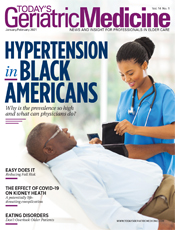
January/February 2021
From the Editor: COVID-19 Complications The new year finds everyone still struggling with the physical, emotional, and social repercussions of COVID-19. As the pandemic continues, more information surfaces about the consequences and complications, particularly those affecting older adults. It’s well known by now that the older population is at the highest risk and that the risk of severe disease is greater for older Americans, especially those with comorbid conditions. Eighty percent of COVID-related deaths have occurred in individuals 65 years of age and older. According to the Centers for Disease Control and Prevention, individuals 65 to 74 years of age have a five times higher rate of hospitalization and a 90 times higher mortality rate than that of those 18 to 29 years of age. For those aged 75 to 84, the risk of hospitalization is eight times higher while the risk of death is 220 times higher. The greatest burden of the disease falls on the oldest old. Those 85 and older are hospitalized at a rate 13 times higher than the younger group, and their risk of death soars to 630 times higher. Not only does the older population face greater risks, they also may experience atypical symptoms such as dizziness, disorientation, apathy, and lack of appetite, which may contribute to a delay in recognition and treatment. They’re more likely to have underlying conditions that may alter certain physiological responses, including cough reflexes and temperature regulation, further clouding the diagnostic picture. Furthermore, their cellular health and immune function may make them increasingly vulnerable. Among the most concerning aspects of the coronavirus in older patients is the potential impact on their kidney health. Contributor Mark D. Coggins reports on what’s known about acute kidney injury related to COVID-19 and explores the possible mechanisms leading to its development. In addition to the physical risks, older adults face psychological risks. Contributor Kathy Hardy explores the emotional toll of the pandemic, looking at the new face of grief. Social distancing has transformed norms of grieving, a consequence of which is that older individuals may be at greater risk for prolonged grief disorder. And finally, the authors of this issue’s “The Last Word” column discuss the ways in which digital safety is increasingly problematic during the pandemic, making the need for better digital decision making more important than ever. Look for continuing coverage of the coronavirus and its effect on geriatric health in future issues. |
